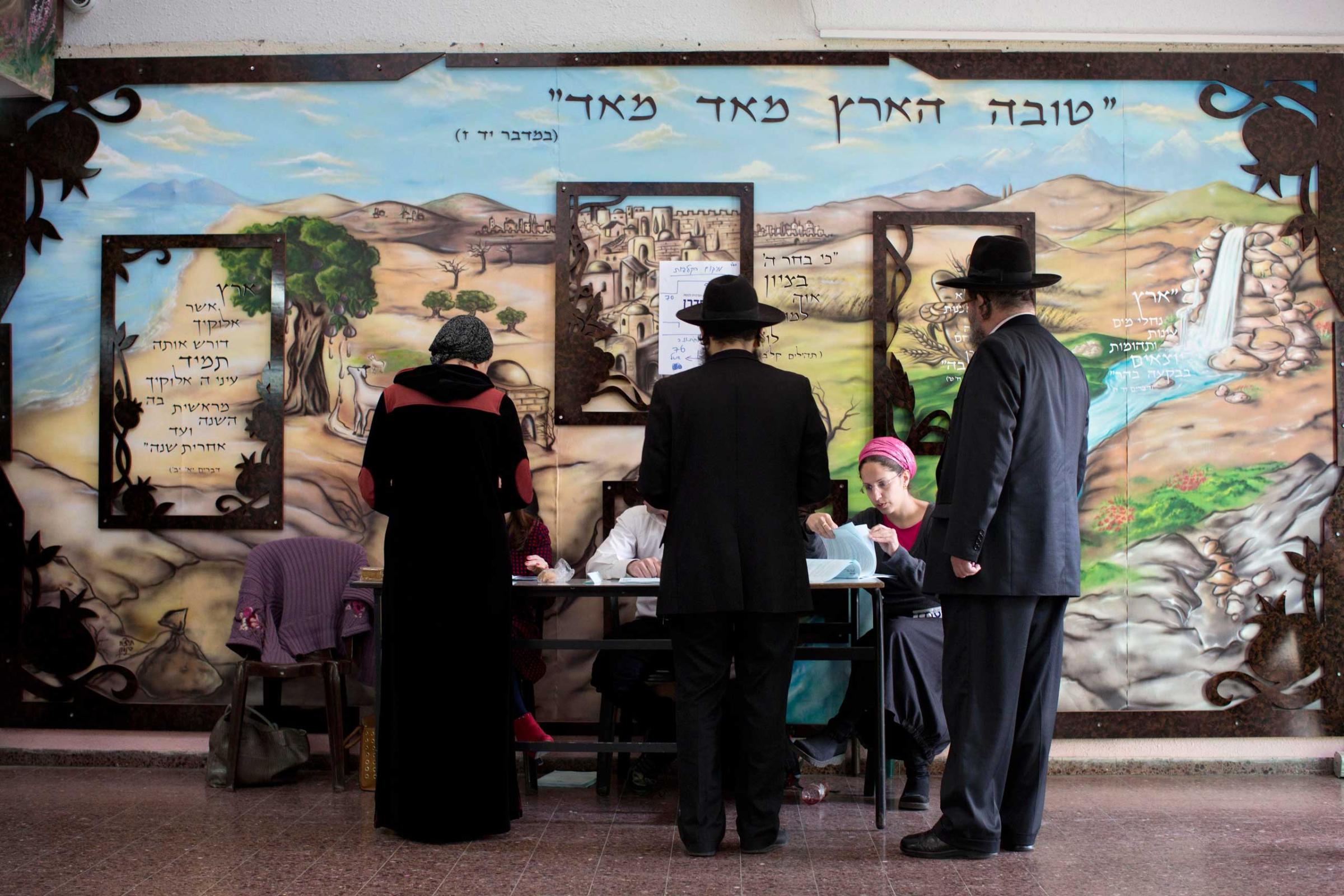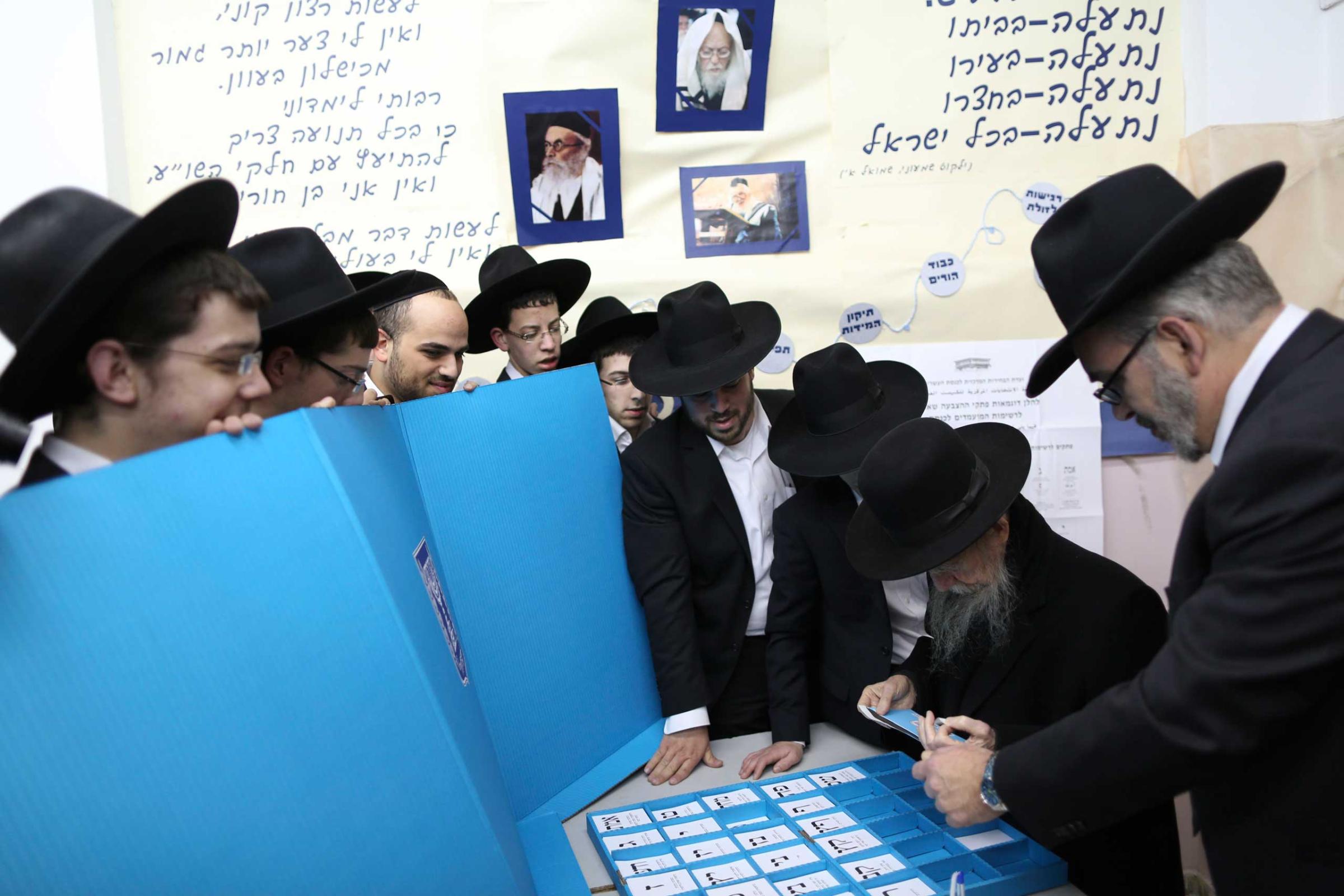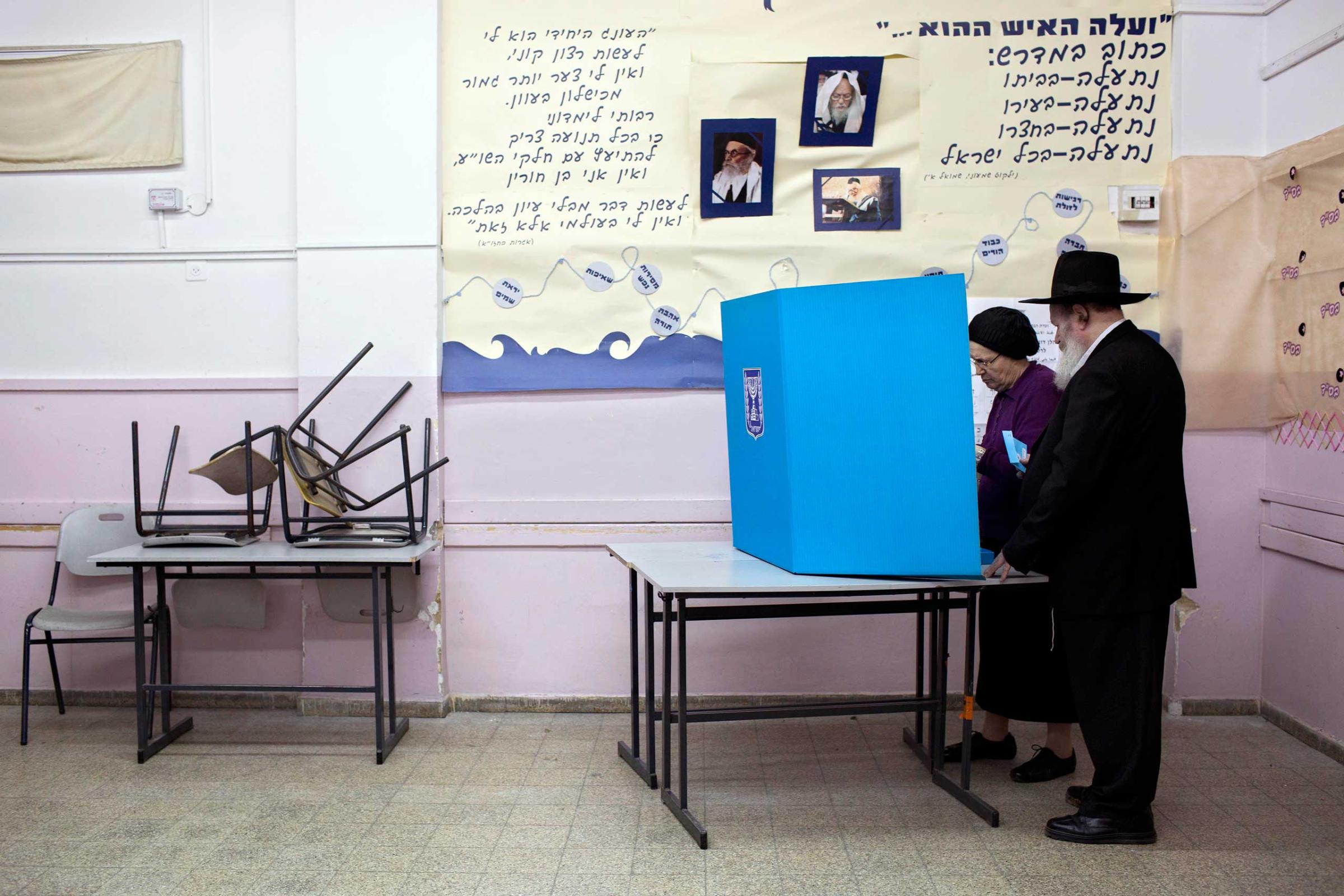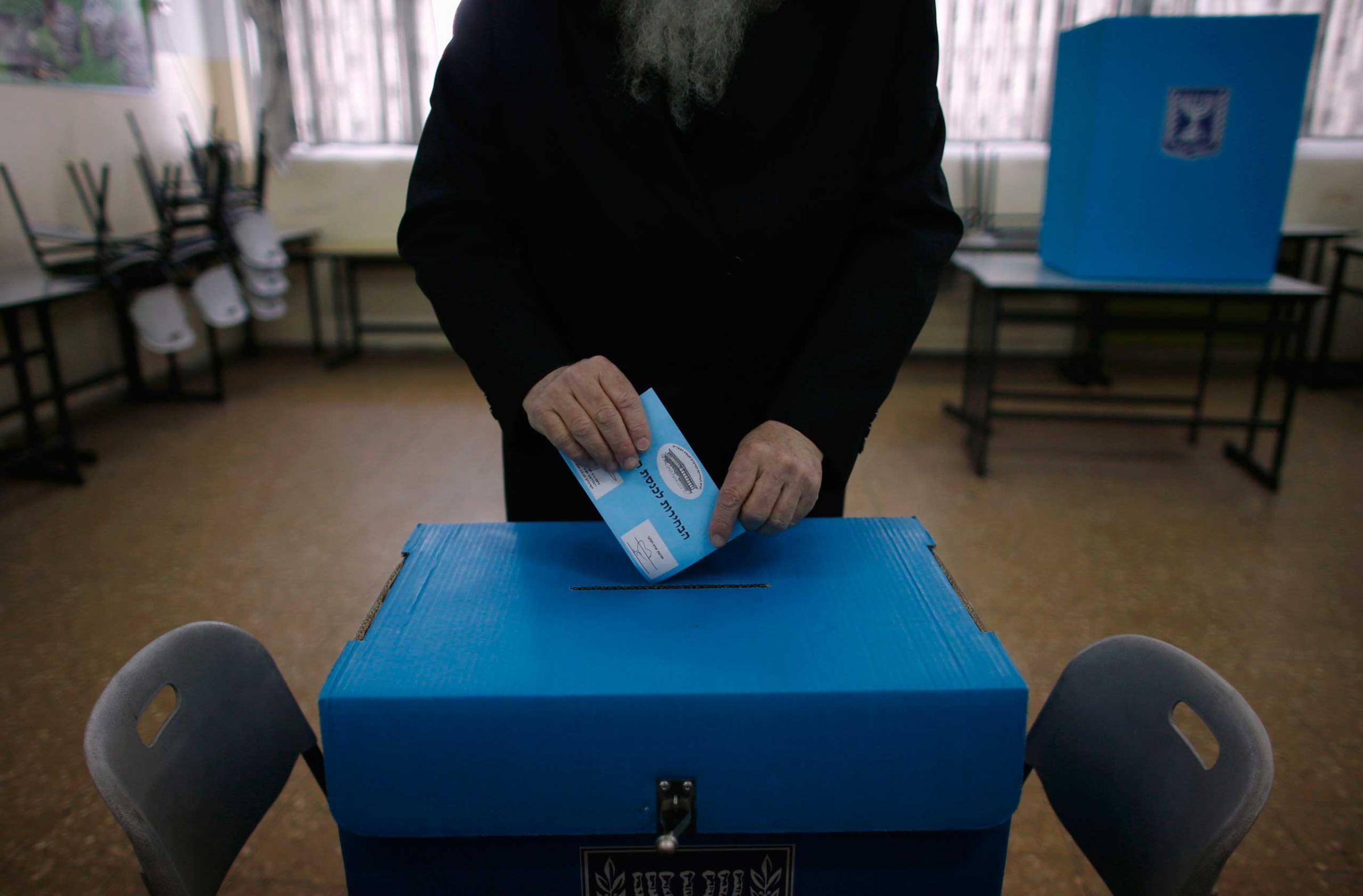Prime Minister Benjamin Netanyahu’s ruling Likud party handily beat its main rival in Tuesday’s elections, official results showed as Israelis awoke Wednesday morning, despite initial exit polls that suggested a closer vote.
Likud won 30 of the 120 seats up for grabs in Knesset, Israel’s Parliament, over the Zionist Union’s 24 seats, according to the elections committee’s tally. That’s a far cry from Tuesday evening, when exit polls conducted by three major Israeli television channels had indicated a relative tie, at 27, between the two parties.
Netanyahu declared victory in an early morning speech as the votes were still being counted.
“Dear friends, against all odds we have achieved a great victory for Likud, for the national camp which is headed by Likud, for our people,” he told supporters at his campaign headquarters in Tel Aviv. “Now we must form a strong and stable government that will care for the security and welfare of all of Israel’s citizens.”
The results are a disappointment for the Zionist Union — headed by Isaac Herzog and Tzipi Livni — which for weeks had shown a four-seat lead over Netanyahu in various opinion polls, and for members of a nonpartisan campaign calling itself V15 (Victory 2015), which declared its main goal was to get Israelis out to vote for any party that would dislodge Netanyahu from power.
When, at one point in the night, the Zionist camp appeared to have won an equal number of seats to Likud, it too claimed to have received a mandate to form a new government. Herzog, speaking a little after midnight, told his supporters that the result of the election would “bring Labor back into power” after 16 years on the sidelines.
“This is a big victory for the Labor Party, which hasn’t done this well since Yitzhak Rabin won in 1992,” he said. He called on the “social parties” — all those who campaigned to help Israelis weather the skyrocketing cost of living here — to unite under him to form “a real reconciliation government.”
Herzog called Netanyahu on Wednesday to congratulate him on his victory, but would not say whether the Zionist Union would consider joining a Netanyahu-led government.
With more than 99% of the votes counted, focus is quickly shifting toward the formation of the coalition government. Israeli President Reuven Rivlin had announced late Tuesday night that he would call on the two leading parties to construct a government. With Likud enjoying such a clear lead, it’s likely Rivlin will put it to Netanyahu to form one.
After each election, Israel’s President is charged with inviting the head of one or more of the largest parties to form a coalition. But in Israel’s fractured political system, being the party with the most votes does not necessarily mean having enough votes to cobble together a government. Given the bitter invective Likud and the Zionist Union have used against each other in the past few months, however, it is difficult to envision them coming together to form a unity government with a rotating premiership, as had been done in decades past. It is possible, however, that Netanyahu will have made so many enemies of late that he’ll find it tough to get to the seats he needs to form a coalition.
Scenes from Election Day in Israel









As Likud and the Zionist Union now start totaling up their potential partners’ projected Knesset seats to see if they might be able to come up with the right sum to present a ruling coalition — a minimum of 61 of the 120 — centrist parties become the cornerstones for building a new government. In this, all eyes are on Moshe Kahlon, a former Likud party member and government minister under Netanyahu who broke away to form the Kulanu party. Exit polls showed it winning nine or 10 seats, with the latter as the final count. While that only makes it the fifth-largest party to be elected, Kahlon’s preferences can either make or break a coalition on offer by either Netanyahu or Herzog.
But Kahlon already rejected an eleventh-hour promise from Netanyahu to be Finance Minister in favor of an endorsement, saying the Premier has too often failed to keep his word. The waters were further muddied on the eve of the elections when a fabricated ad — essentially an audio-clip job put out by the Likud campaign — made Kahlon sound as if he were fully behind Netanyahu. Supreme Court Judge Salim Joubran, who heads the Central Elections Committee, forced Likud to stop using the ad and ordered it to pay a fine of about $5,000. Kahlon said the tape was deceitful and added he could he no longer support a party that “lost its compassion and its social way,” according to the website of the newspaper Yedioth Ahronoth. “That is exactly why I left the Likud.”
Getting slightly more votes than Kahlon was the Yesh Atid party, clocking in at 11 seats. Its leader, Yair Lapid, was Netanyahu’s Finance Minister in the last government but was fired in November when he opposed the Prime Minister on several fronts, from economics to a controversial “nation-state bill” that opponents say is a step back for Israeli democracy. Given that his falling-out was part of the reason Netanyahu dissolved his government and called for new elections in December, he doesn’t make for a promising coalition material either.
The third-largest party, meanwhile, is the Joint List, a recently unified slate of several Arab parties. This party might join in a government led by Herzog — if at all. In the hours before the polls, Netanyahu released a video and a tweet urging his supporters to go out to vote because the “the Arabs are voting in droves,” and saying that “left” had been “busing Arabs to the polls.” The message led to charges of racist campaigning from Netanyahu’s critics and made it unlikely that Netanyahu could find a way to mend fences with Israel’s Arab minority, or the Palestinians, for that matter. On the eve of the elections, he said that if he remains Prime Minister there would be no Palestinian state.
Despite all of that, many analysts said Netanyahu still looked like he had the upper hand in being able to form a coalition. Although he moved well ahead of the Zionist Union, he still has many other coalition partners to choose from, including the ultra-Orthodox parties as well as Naftali Bennett’s Jewish Home party, which largely represents the interests of West Bank settlers and their hopes of expansion.
Bennett’s party won eight seats compared to the 13 it had in the last Knesset. But the party’s relative strength and Bennett’s alliance with Netanyahu points to a path of expanded settlement growth, something that keeps Israel on a collision course with the international community, including the Obama administration, which has called them a hindrance to the peace process. Bennett has long expressed opposition to a Palestinian state.
“Netanyahu has withstood with most serious challenge he faced in continuing as Prime Minister and at the moment has the better chance of forming a government, though it’s certainly not going to be as easy,” said Yehuda Ben-Meir, a public-opinion expert at the Institute for National Security Studies at Tel Aviv University.
“Netanyahu has to make a major decision: whether he wants to form a small, narrow coalition” of center and right-wing parties, added Ben-Meir, or whether to “form a national unity government based on parity between the two largest parties … which is a surprise because the expectation was that neither one of these would be so high, certainly the Likud. What we can say is that Israel has kept to its tradition of surprises in elections. And that nothing is really clear until all the votes are counted.”
More Must-Reads from TIME
- L.A. Fires Show Reality of 1.5°C of Warming
- Home Losses From L.A. Fires Hasten ‘An Uninsurable Future’
- The Women Refusing to Participate in Trump’s Economy
- Bad Bunny On Heartbreak and New Album
- How to Dress Warmly for Cold Weather
- We’re Lucky to Have Been Alive in the Age of David Lynch
- The Motivational Trick That Makes You Exercise Harder
- Column: No One Won The War in Gaza
Contact us at letters@time.com